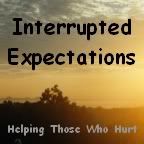Lisa, we both know that there are thousands of people with illness who feel desperately alone and think no one possibly understands what they are going through. What would you tell these people?
LC: Honestly, if I could just sit beside them and give them a long gentle hug I would do that first. I struggle with just listening myself; I always want to start solving the problem! But I know someone to listen to them is what most people really need.
Secondly, I would also validate that they are right--no one really can understand what they are going through. Illness is a unique and lonely experience. That said, there are a lot of ways to connect with people who understand more than they may expect; they just have to find them. There are lots of ways online to connect when you can't drive to a support group. Our social network is Rest Ministries Sunroom and I recently began Illness Twitters to connect people who Twitter about illness or health issues.
Lastly, my faith in the Lord is the foundation of how I cope with my illness, and so I couldn't walk away without at least encouraging them to give God a try. They may have had some negative experiences in the past with a church or Christians, but people are not perfect, and God really does have a plan for their life. And it's God's "Plan A." The illness hasn't bumped their life down to "Plan B." I can admit that this sounds cliche. But each day I hear from people who tell me about how their faith in God is the one thing that gets them up the morning and keeps them looking forward to the next day, rather than dreading it.
As you have been working to get out your message about National Invisible Chronic Illness Awarness, how have you seen blogs and twitter and other forms of social media make a difference, Lisa? Has social media increased how you've been able to reach more people this year to inform them about Invisible Illness Week?
LC: Absolutely. Exponentially! For example we've done a series of tweets on 20 things not to say to a chronically ill person and 20 things to say. Our twitter hashtag is #iiwk09 to find Invisible Illness Week tweets easily. A lot of interesting conversations have been spurred by these tweets. Be sure to follow us @invisibleillwk on Twitter!
We have over 1600 people who have joined our cause on Facebook. And we are giving away prizes to people involved in these different areas of outreach.
How can people get involved with Invisible Illness Week and find out more information?
LC: Thanks for asking! Just helping us spread the word, for example, reading and sharing about this blog post, is the perfect start to be a part of our grassroots cause. I don't have to tell you that we don't have a marketing budget! I hope people know that they are making a difference just by introducing other people to our virtual conference. And not just those who are ill, but spouses, parents, caregivers. Everyone knows someone who is ill. You can find everything about the week at our web site National Invisible Chronic Illness Awareness Week, and we also have some fun items like buttons, tote bags, bumper stickers, silicone bracelets that say, "Invisible Illness, Visible Hope" and awareness pins.
Our theme this year is "A Little Help Gives a Lot of Hope."
We also are looking for bloggers who would like to be a guest blogger on our web site. Or you can just sign up to commit to blogging about invisible illness and Invisible Illness Week on your own blog through Bloggers Unite. We have a Facebook Cause page of course, so it's easy to share with friends and family. Share the video, the twitter "illness facts" we are sending out, things like that. Be sure to mention Invisible Illness Week to your counselor, doctor, pastor, peers, colleagues; we have brochures too.
Some people use this week as an opportunity to call their local paper and share about the week, their support group and their illness, and get featured in a story. Since it's listed in Chase's Annual Events journalists can tie it together.
Lisa, as always, it has been a delight chatting with you. I'm praying for you and for all the men and women in need of support like the kind they will find at the virtual conference next month! I'm looking forward to sharing with you voice-to-voice at noon on Sept. 15 as we talk about Coping with Crisis on top of Chronic and I'm so excited by the descriptions of all the different conference sessions and great speakers lined up this year!






1 comment:
I can't thank you and Lisa enough, not only for this wonderful series of posts, but for all you are both doing to support IIAW. I look forward to hearing you speak.
Post a Comment